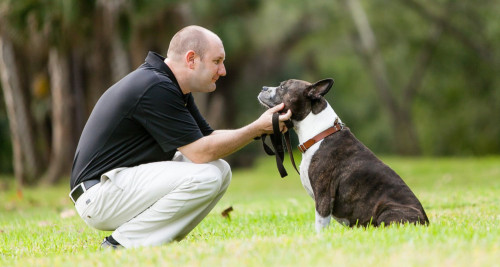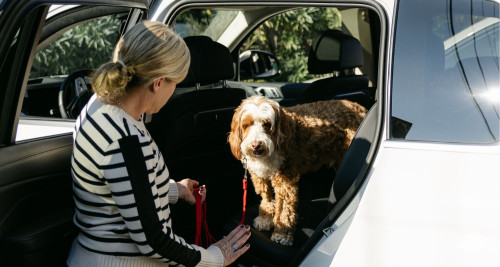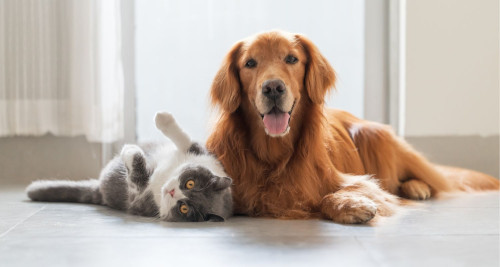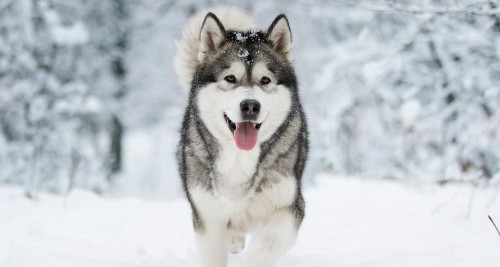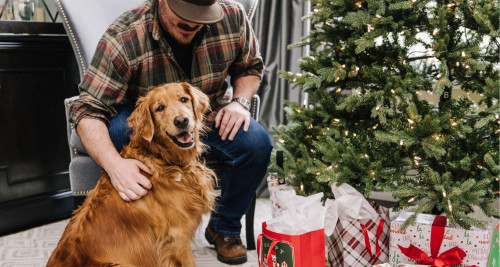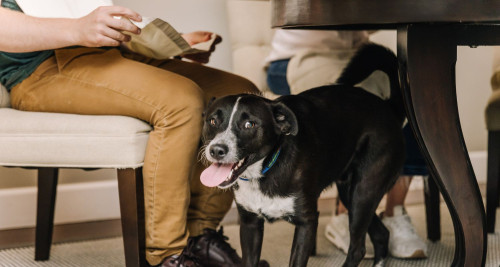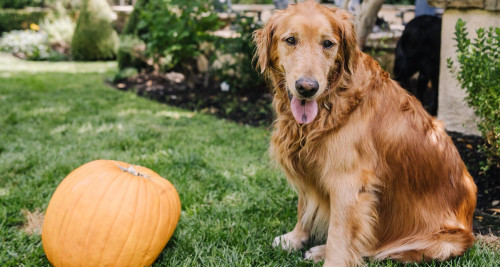Poodle
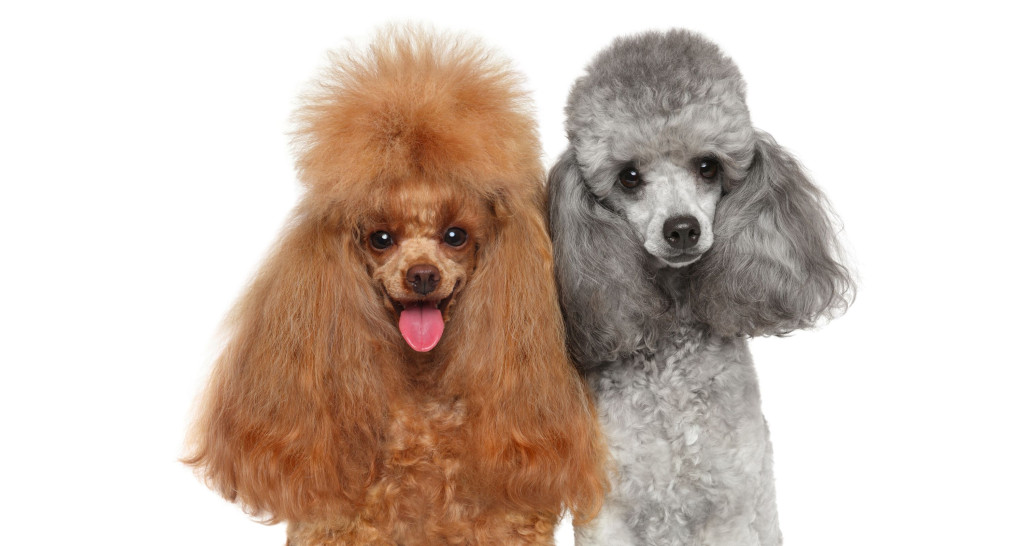
Breed Traits and Characteristics
According to the American Kennel Club, here are some breed characteristic you can find in Poodles.
- Height
Over 15 inches
- Weight
60-70 pounds (male), 40-50 pounds (female)
- Life Expectancy
10-18 years
- Coat Type/Length
Curly/Long
-
100 Affectionate with Family
-
100 Good with Young Children
-
60 Good with Other Dogs
-
100 Trainability Level
-
80 Energy Level
-
80 Barking Level
-
20 Shedding Level
-
20 Drooling Level
History
Would you believe the Poodle was originally bred as a duck hunting dog? These Poodles were larger in size weighing between 40 – 70 pounds. There is controversy surrounding the Poodles’ origin as some sources credit Germany and others France. The word Poodle comes from the German word pudel, or pudelin, which translates to “splash in the water.” Appropriate given their love of water and swimming ability. The French word for Poodle is Caniche, derived from chien canard, which translates to “duck dog.” Poodles have become so popular and adored in France they are now the national breed!
Small poodles (now called Miniature and Toy) were bred with other small poodles and trained to sniff out truffles in European forests.
Poodle-like pictures have adorned Egyptian and Greek artifacts and tombs dating back to the first centuries B.C.
Early gypsies found the Poodle to be great circus dogs, trained to do tricks (such as balance a ball on their nose), while wearing fancy costumes. Gaining in popularity, the merchant class began to “fluff and puff” their dogs as well, leading to what we now know as show dogs.
The Kennel Club in England first registered the Poodle in 1861, and the American Kennel Club followed suit in 1866. The Poodle didn’t become popular in the United States, however, until after World War II, but has remained on the top 10 list of popular breeds ever since.
The Poodle
The Standard Poodle
Often perceived as a “show dog,” elegant and groomed, poodles are considered the second most intelligent breed after border collies. Regal in stature, proud, and particularly family-friendly, you’ll often find a poodle with its head held high supported by a long, strong neck. Don’t be fooled however; poodle’s love to work and to play!
Physical Characteristics
According to the American Kennel Club, poodles come in three sizes: Toy: 10” tall, 6 – 9 pounds, Miniature: 11 – 15” tall, 15 – 17 pounds, and Standard: 15 – 22” tall, 45 – 70 pounds.
The Poodle is unique in that it has hair versus fur. Crossing a poodle with various other breeds is so popular (see doodles), because their hair is hypoallergenic, ideal for people severely allergic to dog dander. Additionally, poodle hair is odorless, so no need to worry about having a stinky dog!
Poodles coats are very curly, wiry, and dense. This dense waterproof coat keeps them protected when swimming, but it also means that it does not stop growing and will need regular clipping and grooming, if you want to keep them looking elegant (see grooming).
The traditional haircut of the Poodle had a purpose! The “lion cut” kept joints and important organs warm while these dogs often splashed around chasing waterfowl in cold water. The rest of the hair was often clipped short to prevent tangling.
Poodle coats come in a range of colors including black, tan, white, gray, silver, brown and crème. Early aristocrats used to dye the Poodle’s coat to their desired color.
Today’s Poodle has an expected lifespan of 10-15 years.
Socialization
Like any breed, the Poodle needs to be socialized with other dogs. If you have a Poodle puppy, make sure you set up playdates with other dogs you know who are well behaved. You don’t want your dog to suffer from any trauma at a young age by being introduced to an overly aggressive dog. This could lead to a fear of other dogs. Dogs learn best from other dogs but they can develop bad habits too.
Poodles can be stubborn so consistency in training is key. Although there are three sizes with many similarities, there are key differences as well. Standard poodles are the most obedient, like to have a job, and are shyer than the smaller versions. Miniature poodles are the most active of the three and are probably the best if small kids are around. Toy poodles make great lap dogs and companion dogs but can be “yappy”. Miniature and Toy Poodles are more mischievous than Standard Poodles.
Be very wary of dog parks before your Poodle is 12 months of age. Too often puppies are bullied or intimidated by older or bigger dogs. The same holds true for doggie daycare.
There is no real way to anticipate how your dog will interact with a large population of different dogs and no way to guarantee if a troublesome dog will be present at a park or daycare.
Poodle Breed Traits
The Poodle’s intelligence requires this breed to be kept mentally and physically challenged. A Poodle whose mind is engaged is much less likely to display unwanted behaviors.
Personality & Temperament
Poodles are known for their sense of humor and playfulness. They are natural born clowns! They get along well with other pets and children and can easily outwit even their pet parents.
Poodles can be stubborn so consistency in training is key. Although there are three sizes with many similarities, there are key differences as well. Standard poodles are the most obedient, like to have a job, and are shyer than the smaller versions. Miniature poodles are the most active of the three and are probably the best if small kids are around. Toy poodles make great lap dogs and companion dogs but can be “yappy”. Miniature and Toy Poodles are more mischievous than Standard Poodles.
Many pet parents treat the toy and miniature sizes as princes and princesses which is how they get their “prissy” reputation. It is important to remember they are dogs, not dolls, or your spoiling will result in destructive behaviors. Your Poodles want to be with you every step of the way, from the ruggedness of throwing a frisbee to the gentleness of visiting your parents at a nursing home. They never want to leave your side!
Capabilities & Traits
Advantages
- Funny, smart, adventurous
- Intelligent, loyal
- Athletic
- Eager to please
- Great family and companion dogs
- Rarely aggressive
- No shedding
- Hypoallergenic
Skills
- Agility, Guide, Obedience, Therapy, Tracking
Uniqe Traits
- Standard Poodles are known for their prowess in obedience, tracking, rally, and agility trials
- Good with children and other breeds
- Respond best to voice tones versus punishment
- Poodles “hairdos” originally had a practical factor – they were sheared for hunting so water didn’t weigh them down in cold water
- Second most intelligent breed – only a border collie is considered “smarter”
- Apart from barking, Poodles are considered one of the least problematic and most stable breeds
Fun Facts
- Poodles are extremely diverse dogs. They have won “Best in Show” from the Westminster Kennel Club five times – in 1943, 1956, 1961, 1973 and 1991. They love to learn and have been known to perform some impressive tricks.
- Although the AKC only recognizes 3 types of poodles (Standard, Miniature, and Toy) there are two other types: Klein and Teacup. The size of a Klein is between a Standard and a Miniature, and a Teacup can weigh as little as 2 pounds
- Poodles prefer people to other dogs
- Early art depicts the Poodle on the European mainland as early as the 15th and 16th centuries
- During the 18th century, smaller poodles became popular as dogs of royalty
- Elvis loved poodles and had a large collection at Graceland
- The 1950s Poodle skirt was a nod to the Poodle’s popularity
- Poodles were featured in films such as Interview with a Vampire, The Burbs, and Zoolander
- The color and coat of a Poodle puppy may change as it matures
Bark Busters Trainer Jeff Drier on Poodles
Poodles are typically very intelligent dogs, which is one reason they are cross bred with so many other breeds to make oodles of doodles. They are also energetic dogs. This combination can make them challenging dogs to live with.
Exercising their brains is a requirement for Poodles. If you don’t keep them busy, they’ll make up their own games, which can tend towards chewing and other destructive behaviors. Practicing basic obedience is certainly a good way to engage their brains. Teaching them tricks is another good tool to use.
Their intelligence makes them very trainable and they often excel in obedience school and even competitive obedience events. The combination of high energy and intelligence make them good candidates for agility competition, if that is something that appeals to you
Most poodles readily take to water. They were originally used to retrieve game from water during hunts. Their love of water and high energy can make them competitive dock divers, which is one of the relatively new sports for dogs combining chasing and jumping with swimming and retrieving all of which can come very naturally to these canine athletes.
If you have a pool and let your poodle swim, make sure you teach it where to exit the pool. Dogs naturally try to get out where they enter so teaching them to always go to the steps is vital for their safety. Watch as Marc Deppe one of our Florida trainers explains and shows the process of teaching your dog how to safely exit a pool.
Due to their intelligence and athleticism, Standard Poodles can make good service dogs, especially performing physical tasks. As with every dog there are pros and cons to their personalities and characteristics. Poodles can be independent and therefore a bit aloof so they are typically not good therapy or emotional support dogs.
Poodles are working dogs and need to be stimulated both mentally and physically and look out when they aren’t. This is often when Bark Busters Trainers are called. Our Trainers have the knowledge and experience to help you channel your Poodles’ intelligence and energy in positive ways allowing you can live together in harmony and instead conflict.
Bark Busters Trainer Christie Price on Poodles
In my 15 years of being a Bark Busters trainer, I've worked with all sizes of poodles and many doodle dogs. Give me a Poodle any day of the week. Regardless of size, they are a cheerful breed. The Poodle is a graceful and proud dog and is said to be the second-most intelligent breed. And because they require calm and confident owners, which are key components of a good Bark Busters client, they are exceptional students. Give a Poodle consistent, firm guidance or he will walk all over you!
The Toy and Miniature Poodles can be yappers, jumpers (and biters). This is fairly typical of all small breeds that over overindulged, coddled and over-handled. The barking is a result of no leadership in the home (oh gosh, do I have to worry about who's at the front door or that garbage truck)? Small dogs figure out pretty quickly that if they jump on a human, they get petted, which just rewards bad behavior. Since dogs generally are not fans of being picked up, they may growl and snap when approached. They may also do a 'head fake' when someone walks over just to give them a pet. I say to clients – remember, you're not picking up an 80-pound Rottweiler! Why are you picking up your 10-pound Poodle? The hands always should be associated as a positive and by minimizing picking up and getting the dog to come to you (not going to the dog); it's easy to change the dog's mind that hands are a good thing.
While the Poodle has always been a popular dog in American homes, it's been the butt of more jokes as a prissy dog with some of those wacky, frou-frou hairdos! Good thing the Poodle has a highly developed sense of humor! In actuality, the Poodle is a water retriever, a working dog, far from prissy, and requires physical and mental exercise to keep it stimulated and engaged. They have great temperaments and adapt well with children and other dogs. As born performers, these dogs thrive doing skillful activities like agility, obedience, tracking to herding and make great assistance or service dogs. And through the years there's been a Poodle or two in the circus.
Poodles love to learn and are pleasers. Daily programming, recall, distance control, attentiveness training and leash work will help maintain your leadership and enhance your relationship. Oh and there's not a Poodle on the planet that doesn't love problem-solving toys.
"Poodles are Labradors with college educations. After a day of retrieving, your Lab wants to curl up in front of the fireplace and take a well-deserved nap. A Poodle wants to be the fourth at the bridge table and tell naughty stories!" – Ann Rogers Clark
Selecting a Poodle Puppy
When you are choosing a Poodle puppy, there are many factors to consider, particularly when it comes to size. For instance, Standard Poodles tend to be calmer than Toy Poodles or Miniature. If you have small children, a Toy Poodle might not be the best choice as they can be hyper. The first thing you must decide is what do you want in a dog? Do you want a “show dog”?
When you get a new puppy, speak to your Bark Busters trainer about training for your dog. A show dog particularly will need training as they have to learn to behave around other dogs and people.
A show dog, one that is capable of winning ribbons, usually comes from a reputable breeder. A good place to start is the Poodle Club of America. A good breeder should provide you with the genetics of both of the parents, any health issues, vaccination schedules, worming instructions and registration with the American Kennel Club.
If you are looking for a family dog, there are many rescues and shelters that are breed specific. Having trained more than one million dogs worldwide, your Bark Busters trainer will tell you it’s a myth that shelter dogs come with more baggage!
If possible, observe the puppies in their natural environment. The puppy who sits off to the side by himself may be calm but harder to socialize. The alpha pup may push the other dogs away for food and jump on them, but can be more bull-headed and difficult to train. As you observe the different personalities and temperaments, you’ll get an idea of which puppy you want to take home
Make sure that you are ready for the grooming responsibility of a Poodle because their hair can be high maintenance. Also, poodles are not used to extreme temperatures and flourish indoors.
Here are some tips for bringing home a new puppy:
-
Bring along a helper to bring your puppy home because he may find the car ride scary. Some dogs even get car sick!
-
Puppies may be skittish about their environment. Don’t bombard them with new sights, sounds and people all at once when you walk in the door. After you give them time to toilet, introduce them to where they will be sleeping (either a dog bed, your bed or a crate) so they have their own place to call home.
-
Dogs like repetition. Establish the best time for eating, playing and going potty outside, so your puppy will know what to expect. Your puppy may cry for the first couple of nights as he is not used to being away from his Mom and littermates.
-
Keep your dog on the same food he was on. If you want to change it in the future, do so gradually.
-
Your pup will appreciate social time and alone time. He may complain at first, but don’t go running every time he barks or yips – this is attention seeking behavior and can lead to separation anxiety.
-
Make sure to get your puppy an identification tag in case he runs off.
Poodle Common Behavioral Issues
Poodles are extremely smart, but that doesn’t mean they don’t need dog training. In fact, you have to be careful so your Poodle doesn’t outwit you! Our Bark Busters trainers consider them good students with a keen passion to learn. Although we often think of Poodles with bouffant hairdos and an air of distinction, make no mistake that the Poodle is a working dog and does best when it has a job to do.
Poodles don’t like to be alone, and are extremely family-friendly, which can often cause separation anxiety. Gentile and sensitive, Poodles respond best to encouragement and praise rather than strong discipline or a harsh voice.
Barking is nearly always an issue. It is not wise to encourage your Poodle puppy to bark! They will find their voice soon enough and then you will need training to address this unwanted behavior.
They are fast learners and once they know what you want, they get with the program. Gentle, consistent training is all that is required when training any breed and Poodles are no different. However, because of their high intelligence, they might try to turn the tables on you and look to train you.
Don’t pick your Poodle up to stop him from an undesirable behavior. Instead, address the behavior by using communication and education methods. At Bark Busters. we want to encourage you to love your pet. When you are picking him up for a snuggle, never try and control him. Dogs and especially Poodles, hate being controlled in this way.
As with any breed, you must establish your leadership or else your Poodle will take charge. When we say you need to be the boss, we don’t mean your dog will lose his enthusiasm or spunkiness. Instead, he will know you are serious about rules and establishing boundaries. If you don’t want your dog barking uncontrollably at the front door, chewing through your favorite slippers, or walking you versus you walking them, your Poodle will need training.
Your Bark Busters trainer can further advise you on how to train your Poodle, to help you understand and overcome the following behavior problem with your Poodle:
- Stubbornness
- Biting
- Nipping
- Separation anxiety
- Leash training
Bark Busters bases its training on the way dogs naturally communicate – through body language and voice tones and dogs respond to these methods. When your dog listens to a command, you reward him with praise and petting. When he doesn’t, you address his undesirable behavior with a tone of voice and body language. never is there a reason to lay an unkind hand on your dog. You can correct your dog without being cruel. The only thing that physical violence will teach your Poodle is fear.
Instead, our dog training will evolve into a relationship with your dog based on love, trust and respect.
Connect with Us!
Need help training your Poodle? Call 1-877-500-BARK (2275)or enter your zip code.
Poodle Health
Common Illnesses and Injuries
Your Poodle’s health concerns will change over the course of their life. A puppy might be more prone to vomiting and diarrhea, a 2-year-old Poodle is more likely to develop Addison’s disease, and a senior Poodle may suffer from hip dysplasia or arthritis. Poodles also have personality and physical traits that may make them more prone to certain conditions—they’re prone to allergies, and because they’re energetic and active dogs, they can suffer from lameness and limping.
At any stage of life, here are some of the most common injuries and illnesses you should be aware of when bringing home a Doodle:
- Allergies
- Conjunctivitis
- Gastroenteritis
- Addison’s disease/hypoadrenocorticism
- Lameness and limping
- Masses
- Hip dysplasia
- Arthritis
If you are ever concerned about your dog’s health, your local veterinarian is a great resource—no matter how small the question.
Genetic Health Concerns
Like many popular breeds, the Poodle has a number of hereditary health issues, like hip dysplasia and allergies. Most reputable breeders now have their breeding stock checked and scored for these hereditary ailments by a vet. You can request proof that the puppy you are purchasing comes from parents that have been checked for these issues.
Because many other health issues are also hereditary, you should do some research on the ancestry of your puppy and any health issues of that particular breed.
Many rescue organizations also check for common-ailments before making them available for adoption.
Preparing yourself
As a pet owner, you should expect to pay for basic veterinary care like vaccines, spay/neuter, and annual checkups. Many pet owners don’t consider the unexpected illnesses and injuries that can occur throughout a pet’s life, and they don’t prepare for them. Medical insurance can help a pet owner prepare.
The concept of medical insurance for pets is fairly straightforward—pay a monthly premium to be covered for eligible veterinary expenses. But every provider is different, offering varied coverage with different plans, pricing options and limitations. As you research, pay close attention to coverage, deductible options, and ease of use.
Poodle Grooming
One of the most challenging tasks to having a Poodle is keeping it well groomed. Because of their hair, Poodles can be high maintenance in the grooming department. They don’t shed, which is what makes them great dogs for people who have allergies. Instead their hair keeps growing and is wiry, unmanageable and dense if not cut every three to six weeks. Because of their curly hair, they are susceptible to ingrown hairs. Also, because Poodles tend to have more hair in their ears than other breeds, they need to be cleaned regularly so air flow can travel in their ear canals. Poodle hair can be easily matted so it is important to brush your Poodle’s hair twice a week.
Many poodles have fancy haircuts, but the most common cuts are the Lion Clip, the Puppy Clip, the Continental Clip and the Bikini Clip.
Poodle puppies need to start having regular dental care at two months and will have their adult teeth by 8 months. Brush your dog’s teeth with pet toothpaste because human toothpaste can upset their stomachs if swallowed. Like some other breeds, their eyes tend to weep, so wipe them daily with a warm cloth or pet wipes.
Tips for Every Dog Owner
Hear from Bark Busters Clients Who Have a Poodle
Build a Better Bond With Your Poodle: Fill Out Our Form and See How Expert Guidance Can Help!
Just confirm your zip code and fill out the form. We’ll contact you within 24 hours to learn more about your dog’s needs. Make the process smoother and more effective — choose personalized in-home dog training.
- 99.7% 4 or 5 stars 99.7% rate their experience with Bark Busters as 4 or 5 out of 5 stars.
- 99.6% Would Recommend 99.6% would recommend Bark Busters to their friends and neighbors.
- 99.5% Dog Responded 99.5% think their dog responded well to the training.
Need Dog Training Assistance with Your Poodle? Find Your Local Trainer Now!
CALL TODAY 1-877-500-BARK (2275)
